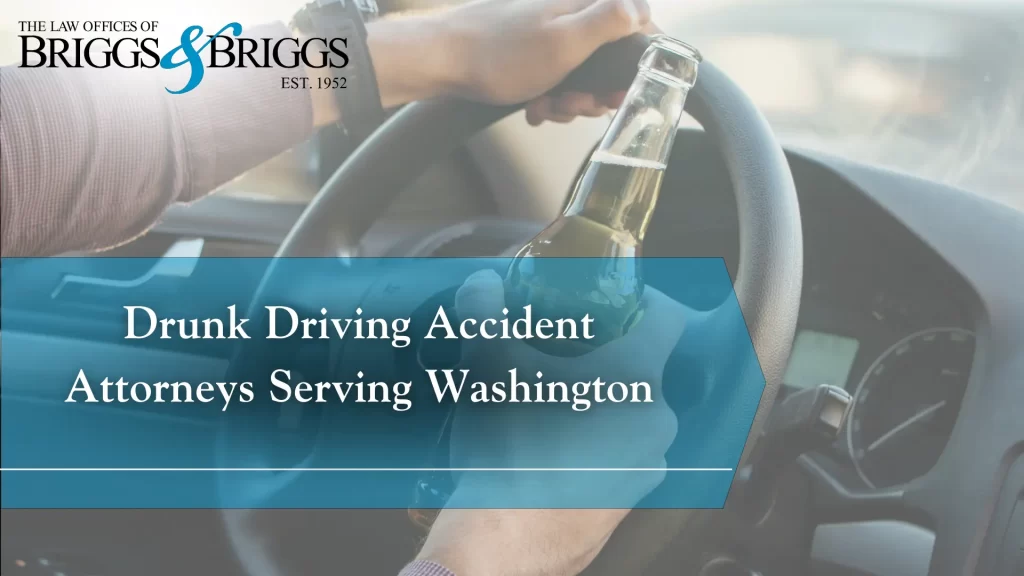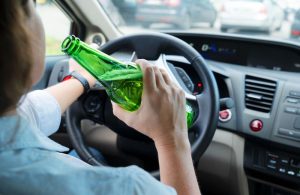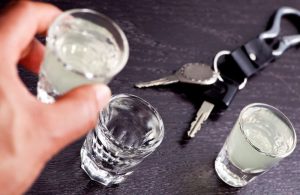
Despite years of awareness education and advertising, drunk driving remains one of the leading causes of vehicular accidents nationwide and in the state of Washington. As of 2016 (the last year for which complete statistics are available), there were 278 fatalities involving impaired drivers, according to the Washington Traffic Safety Commission.
If you have been involved in a collision with a drunk or impaired driver, you should consult an attorney right away. The injuries related to drunk or impaired driving collisions range from minor to life-threatening, and the damage to your vehicle can be catastrophic. The Lakewood car accident attorneys of The Law Offices of Briggs & Briggs are standing by at (253) 588-6696 to help you with your case if you have been involved in such an accident. The consultation is free and confidential- reach out to us today.

Drunk versus Impaired: What’s the Difference?
Washington has two types of DUI charges, “per se DUI” and “impaired DUI.” “Per se DUI” relates to the blood/alcohol content (BAC) or THC level in the driver’s bloodstream according to a blood test. When police give a Breathalyzer test, they are checking for “per se DUI.” In Washington, a BAC of .08 for adults or .02 for minors is the legal limit for DUI.
Washington is unusual in its “impaired DUI” statute. This allows a driver to be charged with a DUI if it is determined they are “affected” by drugs or alcohol while driving a motor vehicle, even if their blood level is below the statutory limit. The Washington State Supreme Court affirmed in Peralta v. State that an individual is affected by drugs or alcohol if they are unable to “operate [their] car in the manner that an ordinary prudent and cautious man, in the full possession of his faculties, using reasonable care, would operate or drive a similar vehicle.”
What this means for the victim of a drunk or impaired driver is that even if the driver did not have a BAC of .08, they still could have been unable to drive like a reasonable person, and thus could be held liable for an accident.
Recognizing a Drunk or Impaired Driver
It would be nice if drunk drivers had a warning light or sign on their cars to let their victims know they were intoxicated before they struck, but you may recognize some signals that you can relay to your attorney when telling your story. Some of the signs of a drunk driver include:
- Swerving, drifting, or weaving across lanes of traffic
- Sudden acceleration, deceleration, or braking for no apparent reason
- Striking or near-misses with parked cars or objects on the side of the road
- Slow response to traffic signals or ignoring stop signs
- Improper signaling, such as signaling left and then turning right
- Driving too fast or too slow for road conditions
If you recall seeing the vehicle that hit you displaying any of these behaviors before the accident, or if you have witnesses who can describe such behaviors, it may be indicative of impaired driving. If you have questions about your own case, don’t hesitate to contact us today.
Dram Shop Laws and Insurance Rules
The State of Washington has encoded its dram shop laws, which make bars and other places that sell liquor liable for selling alcohol to intoxicated patrons who go on to cause an accident.
The dram shop laws were upheld in a court case known as Barrett v. Lucky Seven Saloon, and established that the bar or restaurant can be held liable if three requirements are met:
- The bar sold alcohol to a customer who was “apparently under the influence” or who was a minor
- The customer consumed the alcohol at the establishment
- Consuming the alcohol was the cause of the injury, death, or damage
The bar need not know for certain that the customer was intoxicated, they need only believe that the customer was “under the influence” based on their behavior. The personal injury must have been caused directly by the consumption of the alcohol from the bar.
So, for example, John has been drinking all night at the bar and asks for “one for the road,” which they sell him. He gets into his car, blacks out at the wheel, and crashes into Sue. Sue has a claim against the bar for selling John the last drink. However, if John makes it all the way home, staggers out of his car, and passes out in his living room, and his car later rolls down the driveway and crashes into Sue, she will not have a claim, because the accident would not be related to the drink.
If the intoxicated driver has liability insurance, their insurance will cover the damages caused by them, that is, your injury and losses. The driver may not be covered for his or her own injuries.

What to Do After an Accident
If you believe the other driver was impaired or intoxicated, try to make note of what leads you to believe that. If a witness saw the driver swerving or hitting a parked car before the accident, try to get their name and contact information.
If the driver is given a field sobriety test or Breathalyzer test at the scene, you should let your attorney know right away. A police report with that information will establish the other driver’s liability, but your attorney may need to request it, especially if the other driver is involved in a criminal case related to the DUI.
If a bar or restaurant is involved, you will need to file an insurance claim with their insurer. This may be something to discuss with an attorney as well.
How We Can Help
A crash caused by the actions of a drunk driver in which you were injured is not to be ignored. You and your loved ones may be seriously injured or worse, and you are entitled to compensation. The attorneys at The Law Offices of Briggs & Briggs can help you get the justice you deserve and the recovery you need to heal. Call us at (253) 588-6696 for a free consultation and review of your case, so that we can help start the process of pursuing compensation today.
